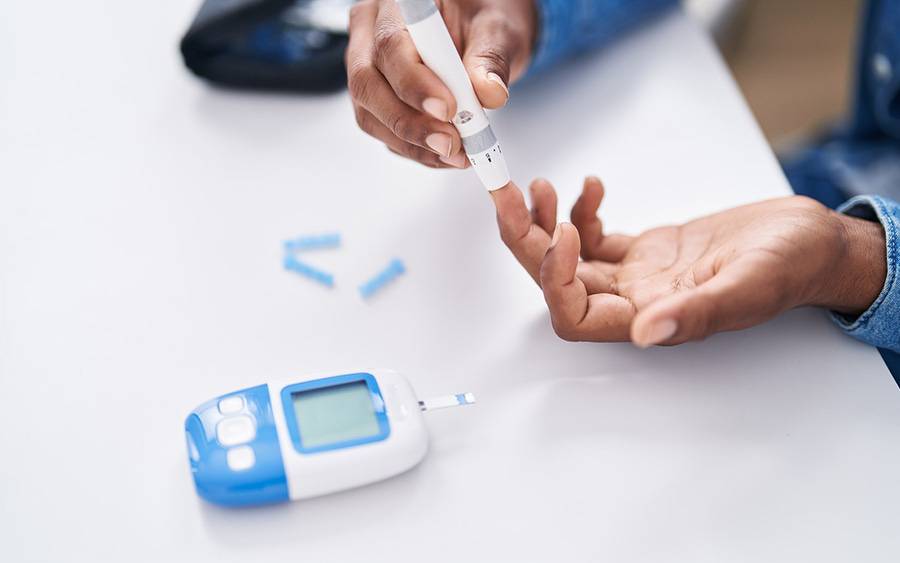How Does Diabetes Affect Your Mental Health?
Stress and depression can make self-care harder

Stress and depression can make self-care harder
Anyone with diabetes knows that successfully managing the condition isn’t easy. Managing diabetes is a day-to-day endeavor. It involves eating healthy, exercising, checking blood sugar, taking medication or insulin and more.
But diabetes doesn’t just impact your physical health. It can affect your emotional wellbeing.
“If you have difficulty keeping your diabetes safe, it can negatively affect how you think and feel about yourself,” says Karla Espinosa de los Monteros, PhD, a clinical health psychologist who specializes in diabetes behavioral health at the Scripps Whittier Diabetes Institute.
Diabetes-related distress and other mental health conditions, such as depression and anxiety, can negatively impact your thoughts, emotions and self-image, making it hard to prioritize and follow through with diabetes self-care. If not treated, these conditions can increase your risk for future complications.
“Experiencing occasional distress over the demands of managing diabetes, or other stressors in your life, is normal and not something to be too concerned about. However, if you feel that the distress you are experiencing is impacting your ability to take care of yourself, or to enjoy your life, it’s a sign to reach out for help,” Dr. Espinosa de los Monteros says.
Fortunately, treatment is effective, but it’s crucial to recognize symptoms that indicate you are struggling and could use professional help.
Depression
If you have diabetes and mental health concerns, it’s important to know that both are treatable.
Depression is a medical condition with several symptoms including:
- Sadness
- Loss of interest
- Tiredness
- Difficulty concentrating
Any of these can make diabetes management more difficult.
Stress and anxiety
Stress is a physical and emotional response to a stressful external event, such as a test or performance review. Experiencing stress is normal and unavoidable. However, if stress becomes chronic, it can take a toll on your mental health, making it even harder to care for yourself.
Moreover, because stress hormones released during times of stress directly impact blood sugar, chronic stress can also impact your diabetes management by temporarily decreasing the effectiveness of your self-care efforts.
When you are under a lot of stress you may find that you are constantly worrying about things that could happen or feel out of your control. This is known as anxiety.
“Anxiety is tricky because even when the external stressor is gone, it can linger and affect your daily life,” Dr. Espinosa de los Monteros says. “It is not uncommon for people living with diabetes to experience anxiety over diabetes management as diabetes care can be demanding.”
Diabetes distress
Depression and anxiety can affect anyone, but those with diabetes may also experience what is known as diabetes distress.
“People with diabetes distress often feel discouraged, worried, or simply tired of managing their diabetes care,” Dr. Espinosa de los Monteros says. “This can happen if you’re not making progress in managing your diabetes or have health issues despite taking good care of yourself.”
If you feel discouraged, it’s hard to stay engaged in diabetes care. You might not check your blood sugar often or go to your doctor appointments. You may find it harder to abstain from eating foods that are not good for you. Remember, your diet is important for managing your blood sugar and diabetes.
Though the symptoms may feel like depression or anxiety, diabetes distress doesn’t respond to medications as the cause of the distress is different and specific to diabetes care.
Tips to help manage mental health
These five steps can help you manage your mental health if you have diabetes:
1. See a diabetes specialist
If you are not already seeing an endocrinologist, make an appointment. These physicians specialize in diabetes care.
2. Seek mental health support
If you are concerned about your mental health, talk to your doctor. Ask for a referral to a counselor who specializes in chronic health problems.
3. Do one thing at a time
Focus on one goal at a time, instead of trying to do everything at once.
4. See a diabetes educator
A diabetes educator can help you create a diabetes plan that suits your lifestyle, beliefs and culture. They can teach you how to deal with the daily challenges of diabetes and lower the risk of problems.
5. Join a support group
Join a diabetes support group where you can share your struggles with others who are going through the same thing and find answers together.
“Often people find relief in simply knowing that they are not alone in struggling with diabetes and this can be the first step in their journey towards healing says Dr. Espinosa de los Monteros. “Along the way they may also learn helpful tips and strategies that will make their life with diabetes less difficult.”
Mental health support at Scripps
Dr. Espinosa de los Monteros recommends finding programs that provide emotional and behavioral support for people with diabetes.
The Behavioral Health Integration (BeHIP) Program at Scripps Whittier Diabetes Program offers short term therapy for Scripps patients. Clinical psychologists are available to help patients manage and cope with the emotional side of living with diabetes.